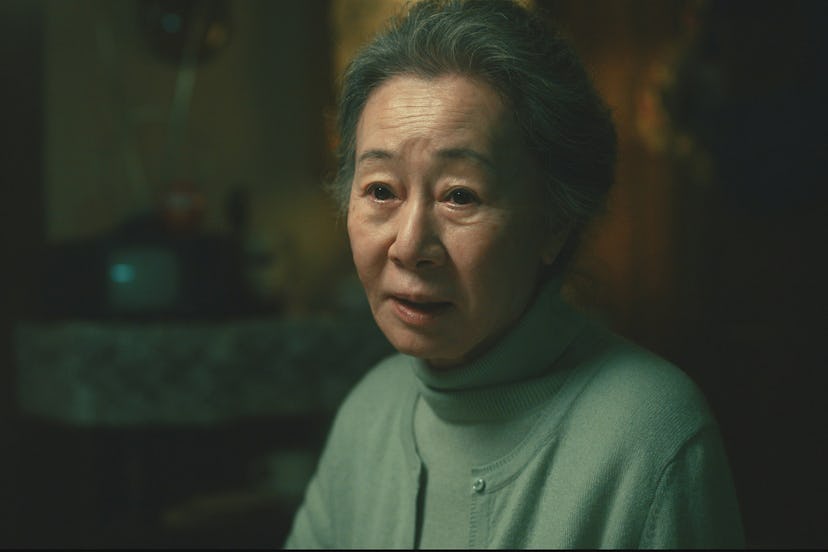Bustle Exclusive
Pachinko Forced Youn Yuh-Jung Out Of Her Comfort Zone
The actor opens up about playing Sunja, her viral Oscars speech, and dancing in public.

Flustering a veteran actor like Youn Yuh-jung is no small task. Throughout her five-decade career, she’s played various characters, ranging from Woman of Fire’s femme fatale to the grandmother in Minari (the role for which she won her first Oscar at age 74). But Pachinko posed a particular challenge for the South Korean actor, and it had nothing to do with the series’ many tear-jerking moments.
The obstacle to be conquered? Dancing for the show’s joyous opening credits montage. “I’m 78, I’m old-fashioned,” Youn tells Bustle. “I never danced in public. In my time, [you didn’t dance] unless you were a very ‘bad girl.’”
Despite begging to opt out, she eventually gave in to her “very stubborn” showrunner, Soo Hugh, who chose music Youn would appreciate. To the tune of the Grass Roots’ 1969 hit “Wait A Million Years,” the actor whirled down the aisles of a pachinko parlor, twirling and being led into a tango by her regular scene partner and onscreen grandson, Jin Ha.
Art mimics life in the second season of the critically acclaimed Apple TV+ adaptation of Min Jin Lee’s bestselling 2017 novel, which follows three generations of a Korean family in pre- and post-war Japan. Between moments of heartache and defeat, the period drama veers from the book with a new storyline for Youn’s Sunja through which she navigates her relationship with her grandson, Solomon, as well as an unexpected friendship.
The new arc posed another challenge for Youn: memorizing lines in a foreign language, Japanese. She blames it all on Ha, whom she considers a “very great actor.” “He doesn’t have experience speaking Japanese, [but] he’s a singer, so he phonetically memorized his lines,” she says. “He was so good [that] the showrunner thought, if he could do it, I could do it. But I’m too old to memorize, I’m not adopting new things.” Then, with a laugh: “It was a terrible experience.”
Here, Youn opens up about Sunja’s journey, the “embarrassing” show she likes, and her viral Brad Pitt shoutout at the Oscars.
The stereotypical grandmother in films, especially Western ones, is wise, powerful, and sometimes even a little dictatorial. But Sunja is very different. Why do you think that is?
Was I different than the Western grandmother? [Being a] grandma is worldwide. I raised my two sons, and [I] worried so much because that was my first experience raising a child. But after I became a grandmother, the difference was that I could relax, and I [could] just watch them grow up and enjoy them. If they make a mistake, it’s fine.
But Sunja was different. She worried very much about her grandson because his mother passed away when he was a little boy, so I felt like both his mother and grandmother at the same time.
Did you draw on memories of your own grandmother or mother for Pachinko?
My grandmother passed away during the Korean War [when] I was little. But my great-grandmother lived until [I was] 10. And the thing [I] regret is I didn’t like her. It was [a] stupid reason. After the war, we had a city water restriction. We had to get the water and save it for the next day. She would reuse the water again and again. I felt so dirty, I thought she wasn’t hygienic. I didn’t know she was saving for us. I’ve been praying for her. I ask her to forgive my ignorance.
Wow, that’s really powerful. Did you ever draw from that experience to portray Sunja?
The situation was different, so I was thinking of her, but not throwing her situation to this character.
Cooking for her family is Sunja’s love language. Is that also true for you?
Eating is very important for Koreans. Instead of [saying] hello, we say, “Did you eat?” That’s our greeting. After my two sons graduated college, I told them, “I’m [a] working mother.” I couldn’t cook for them. I didn’t have time. So, I talked to my first son. [I said,] “Every family has a mother’s recipe. I feel sorry for you.” And then he said, “That’s why we are skinny. I’m so grateful that we are skinny.”
The scene in Episode 4 where Sunja dreams of her grandson and then goes to Tokyo to cook for him is so moving.
That’s the Korean way. She dreamt about him and felt something dangerous, [and] she wanted to find out [he was OK with] her own eyes. And of course, she brought his favorite dish, Galbi-jjim: braised short rib.
My editor spoke with Jin Ha, who mentioned you’re a big Outlander fan. What do you like about that show?
It’s kind of embarrassing. People tease me because I don’t want to see violent scenes, sex scenes, and time slips. And it has all three of them. I probably watched until Season 4. I don't watch Netflix anymore because you [get] addicted to it.
Your Oscars acceptance speech went viral for shouting out Brad Pitt. Have you talked to him since?
No, I didn’t. Brad Pitt is such a big star. But to me, he was the producer of Minari. In Korea, producers usually visit the set and then treat us to some kind of meal. [A] meal is very important for Koreans. [But] he never showed up.
I thought, “Why didn’t you show up while we were shooting?” Then people got so shocked. After that, we had a little chat backstage. And [later, when] he was visiting in Korea, doing interviews, people said he was mentioning my name and [asking], “Oh, she’s going to scold me. Am I saying it right?” That’s what I heard.
This interview has been edited and condensed for clarity.